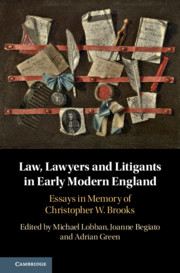(Source: CUP)
Cambridge University Press has published an
edited collection on Law, Lawyers and Litigants in Early Modern England in
memory of Christopher W. Brooks.
ABOUT THE BOOK
Written in
memory of Christopher W. Brooks, this collection of essays by prominent
historians examines and builds on the scholarly legacy of the leading historian
of early modern English law, society and politics. Brooks's work put legal
culture and legal consciousness at the centre of our understanding of
seventeenth- and eighteenth-century English society, and the English common law
tradition. The essays presented here develop a number of strands found in his
work, and take them in new directions. They shed new light on central debates
in the history of the common law, exploring how law was understood and used by
different communities in early modern England, and examining how and why people
engaged (or did not engage) in litigation. The volume also contains two
hitherto unpublished essays by Christopher Brooks, which consider the
relationship between law and religion and between law and political revolution
in seventeenth-century England.
ABOUT THE
EDITORS
Michael
Lobban, London
School of Economics and Political Science
Michael Lobban is the author of a number of works on eighteenth- and nineteenth-century English legal history. He was a colleague of Christopher W. Brooks' at the University of Durham, and co-edited the volume Community and Courts in Britain 1150–1900 (1997) with him.
Michael Lobban is the author of a number of works on eighteenth- and nineteenth-century English legal history. He was a colleague of Christopher W. Brooks' at the University of Durham, and co-edited the volume Community and Courts in Britain 1150–1900 (1997) with him.
Joanne
Begiato, Oxford
Brookes University
Joanne Begiato has published widely in the history of emotions, material culture, masculinities, family, parenting, and marriage. Her Ph.D. was supervised by Christopher W. Brooks at the University of Durham.
Joanne Begiato has published widely in the history of emotions, material culture, masculinities, family, parenting, and marriage. Her Ph.D. was supervised by Christopher W. Brooks at the University of Durham.
Adrian
Green, University
of Durham
Adrian Green studies the history of buildings, especially the relationship between architecture and society in England and English America between the Reformation and Industrial Revolution. His Ph.D. in Archaeology and History was supervised by Matthew H. Johnson and Christopher W. Brooks at the University of Durham.
Adrian Green studies the history of buildings, especially the relationship between architecture and society in England and English America between the Reformation and Industrial Revolution. His Ph.D. in Archaeology and History was supervised by Matthew H. Johnson and Christopher W. Brooks at the University of Durham.
TABLE OF
CONTENTS
1. Introduction Michael Lobban, Joanne
Begiato and Adrian Green
2. Christopher Brooks's contribution to early modern history Michael J. Braddick
3. Law, law-consciousness and lawyers as constitutive of early modern England: Christopher W. Brooks's singular journey David Sugarman
4. 'The hard rind of legal history': F. W. Maitland and the writing of late medieval and early modern British social history R. A. Houston
5. Fountains of justice: James I, Charles I and equity R. W. Hoyle
6. The Inns of Court, Renaissance, and the language of modernity Phil Withington
7. The micro-spatial dynamics of litigation: the Chilvers Coton tithe dispute, Barrows vs. Archer (1657) Steve Hindle
8. 'Law-mindedness': crowds, courts and popular knowledge of the law in early modern England John Walter
9. Local laws, local principles: the paradoxes of local legal processes in early modern England Peter Rushton
10. 'So now you are wed enough': clandestine unions in the north-west of England in the first half of the eighteenth century Joanne Begiato
11. 'Blunderers and Blotters of the Law? The rise of conveyancing in the eighteenth century and long term socio-legal change' Craig Muldrew
12. England and America: the role of the Justice of the Peace in County Durham, England and Richmond County, Virginia, in the eighteenth century Gwenda Morgan
13. Law and architecture in early modern Durham Adrian Green
14. Law and revolution: the seventeenth century English example C. W. Brooks
15. Religion and law in early modern England C. W. Brooks.
2. Christopher Brooks's contribution to early modern history Michael J. Braddick
3. Law, law-consciousness and lawyers as constitutive of early modern England: Christopher W. Brooks's singular journey David Sugarman
4. 'The hard rind of legal history': F. W. Maitland and the writing of late medieval and early modern British social history R. A. Houston
5. Fountains of justice: James I, Charles I and equity R. W. Hoyle
6. The Inns of Court, Renaissance, and the language of modernity Phil Withington
7. The micro-spatial dynamics of litigation: the Chilvers Coton tithe dispute, Barrows vs. Archer (1657) Steve Hindle
8. 'Law-mindedness': crowds, courts and popular knowledge of the law in early modern England John Walter
9. Local laws, local principles: the paradoxes of local legal processes in early modern England Peter Rushton
10. 'So now you are wed enough': clandestine unions in the north-west of England in the first half of the eighteenth century Joanne Begiato
11. 'Blunderers and Blotters of the Law? The rise of conveyancing in the eighteenth century and long term socio-legal change' Craig Muldrew
12. England and America: the role of the Justice of the Peace in County Durham, England and Richmond County, Virginia, in the eighteenth century Gwenda Morgan
13. Law and architecture in early modern Durham Adrian Green
14. Law and revolution: the seventeenth century English example C. W. Brooks
15. Religion and law in early modern England C. W. Brooks.
More info here


No comments:
Post a Comment